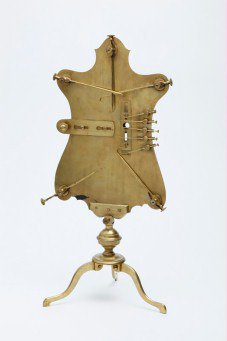World Knowledge
dal 22/9/2010 al 8/1/2011
Segnalato da
22/9/2010
World Knowledge
Martin Gropius Bau, Berlin
The exhibition in honour of the anniversary year 2010 places Berlin science in a world context, as it is only in the dynamic interplay of local and global networks that Berlin has been amassing for 300 years knowledge of the world which has then been sent back out into the world. However, World Knowledge does not just showcase success stories, but also tells of lapses and false trails. Attention is drawn to scientists like the Nobel Prize Laureate Fritz Haber, who conducted experiments on ammonia synthesis that revolutionized food production worldwide yet is also considered to be a pioneer of chemical warfare.

The history of science in Berlin is a history of important scholars, Nobel Prize Laureates, pioneering inventions and achievements. Gottfried Wilhelm Leibniz, perhaps the last of the great universal scholars, did some of his work in Berlin. Albert Einstein put the finishing touches to his General Theory of Relativity here. Karl Richard Lepsius brought treasures from Egypt back to the city. The electron microscope was invented in Berlin. It was here that Konrad Zuse built the first computer. Jacob and Wilhelm Grimm wrote their famous “History of the German Language” in Berlin, and just two years ago a Berliner, Gerhard Ertl, received the Nobel Prize for Chemistry.
Berlin was also a city where female researchers gave science a new impetus, making inroads into what had previously been a male preserve: Lise Meitner did basic research here into radioactivity. And in 1912 Lydia Rabinowitsch-Kempner was the first woman in Berlin to be awarded the title of professor for her successful study of tuberculosis. Berlin also boasts world-famous collections, from Rudolf Virchow’s anatomical and pathological preparations through the holdings of the Botanical and Natural History Museums to the antiques collection of the Staatliche Museen. “WeltWissen – World Knowledge” brings together these and many other topics in a major, cross-discipline show.
The exhibition in honour of the anniversary year 2010 places Berlin science in a world context, as it is only in the dynamic interplay of local and global networks that Berlin has been amassing for 300 years knowledge of the world which has then been sent back out into the world. However, “WeltWissen – World Knowledge” does not just showcase success stories, but also tells of lapses and false trails. Attention is drawn to scientists like the Nobel Prize Laureate Fritz Haber, who conducted experiments on ammonia synthesis that revolutionized food production worldwide yet is also considered to be a pioneer of chemical warfare.
Rahel Hirsch exemplifies the enormity of the expulsions of Jewish scientists and academics after 1933. The exhibition shows this exodus of scholars fleeing National Socialism and the attempt to rebuild the city’s scientific resources afterwards in both West and East. In the Lichthof of the Martin-Gropius-Bau visitors will be welcomed by a large installation, a joint project between “WeltWissen – World Knowledge”, the design offices Space4 and Teamstratenwerth, and the American artist Mark Dion.
Dion is a passionate collector whose obsessive passion moves him to develop objects and sculptures and arrange them in the form of installations reminiscent of natural history showrooms. In his famous productions – such as those at the Skulptur Projekt Munster, the Tate Britain, London, and the Museum of Modern Art, New York – he combines natural phenomena in artfully arranged scenarios. The Lichthof installation will present the wealth and variety of 300 years of scientific history in Berlin, while also emphasizing the patchwork nature of scientific knowledge driven by human curiosity.
Apart from guided tours, the exhibition offers an extensive events programme in which experts in various fields will demonstrate their approaches to subjects of current research in lectures, discussions and presentations. Videobus tours will take visitors from the Martin-Gropius-Bau to the scientific sights of Berlin. The exhibition also features a didactic programme for children and young people as well as special offers for schools, like the “junior labs”.
http://www.weltwissen-berlin.de
Image: Lieberkühn's Microscope, ca. 1740
© Anatomische Sammlung am Centrum für Anatomie der Charité, Foto: Eberle und Eisfeld
Press Contact
Achim Klapp Medienberatung: Tel. 030 / 25 79 70 16,
presse@weltwissen-berlin.de
Opening 23 September 2010, 11h
Martin Gropius Bau
Niederkirchnerstrasse 7, Berlin
Opening Hours: Wednesday to Monday 10-20
Tuesday closed
Tickets € 6.00 | € 4.00 reduced
Groups (from 10 pers.) € 4.00 p.p.
Free admission for visitors under 16 years.



